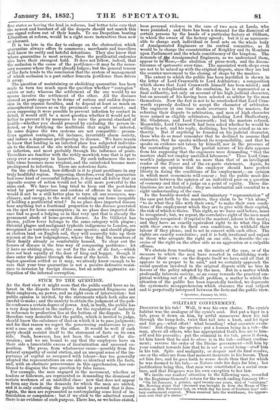NEW ASSAULT ON THE QUARANTINE SYSTEM.
THE Autocrat of all the French, it is said., has decreed that the Lazaretto of Marseilles be sold, and docks substituted in its place ; and it is not a very extravagant interpretation of the fact to sup- pose that he intends to abolish quarantine. The less so as very important improvements in medical regimen have constantly ori- ginated in France, and particularly in the handling of epidemic diseases—such as the arsenical treatment of agues. Some doubt is felt, however, as to the real bearing of the decree, and confes- sedly it is not in itself an abolition of quarantine. But it looks like a step towards it; and those who wish to keep up the credit of free states as having the lead in reforms, had better take care that the newest and harshest of all the despots should not snatch this one signal reform out of their hands. To see Despotism beating Liberalism at reform, would be a sight more instructive than new or pleasant. It is too late in the day to enlarge on the obstruction which quarantine always offers to commerce ; merchants and travellers well know its costly and hateful detentions. They also know that where quarantine is most severe, there the pestilential endemics also have their strongest hold. It does not follow, indeed, that the seclusion is the cause of the pestilence—it may be the neces- sary recourse where the pest already lodges ; but the general tenour of the facts tends to the conclusion that the system of management of which seclusion is a part rather foments pestilence than drives it away. The question of maintaining or abolishing quarantine has been made to turn too much upon the question whether "contagion" exists or not; whereas the settlement of the one would by no means involve the settlement of the other. All the diseases classed as pests appear to be forms of serious and sudden depres- sion in the organic faculties, and to depend at least as much on atmospherical causes as on the proximate cause of contact ; and even supposing it were possible to prevent infection by contact in detail, it would still be a moot question whether it would not be better to prevent it by measures to raise the general standard of health—whether you should proceed by excluding the person in- fected, or by fortifying the multitude that might be infected. In some degree the two systems are not compatible : precau- tions against contagion, for instance, invariably alarm society, and induce a depression predisposing to disease. We have reason to know that landing in an infected place has subjected individu- als to the disease of the site without the possibility of contagion or infection, and most probably through the influence of panic. Travellers are familiar with the sickly mawkish tone that is apt to creep over a company in lazaretto. By such influences the mor- hi& virus becomes more virulent, and the uninfected become more predisposed to infection. These are notorious fads. On the other hand, how difficult is it to plant pestilence in any truly healthful region. Supposing, therefore, even that quarantine had some kind of successful influence, it does not all follow that an opposite course of action would not be still more powerful to the same end. We have too long tried to keep out the pest-laden wind by port regulations and cordons of officers in blue coats: would it not be a still better plan to turn all our resources, ma- chinery, and energy, to the work of rendering our home incapable of holding a pestilential wind ? In no place does imported disease bear anything but a fractional proportion to the disease generated on the spot for home consumption ill no place does imported dis- ease find so good a lodging as in that very spot that is already the permanent abode of home-grown disease. As Dr. Gillkrist has shown, yellow fever belongs to the same category with plague; Oriental plague and malignant typhoids indigenous to London, are recognized as varieties only of the same species; and should plague or cholera land on English soil, they will assuredly take up their sojourn at the low lodgmghouse where they find the members of their family already so comfortably housed. To clear out the houses of disease is the true way of conquering pestilence : let it have no abiding place, no rest for the sole of its foot,—which does not beat equally at the door of king and beggar, though it does enter the palace through the door of the hovel. Be the con- tagion question settled as it may, we'already know enough to be sure that your true quarantine is not a passive defensive resist- once to invasion by foreign disease, but an active aggressive ex- tirpation of the internal corruption.



























 Previous page
Previous page